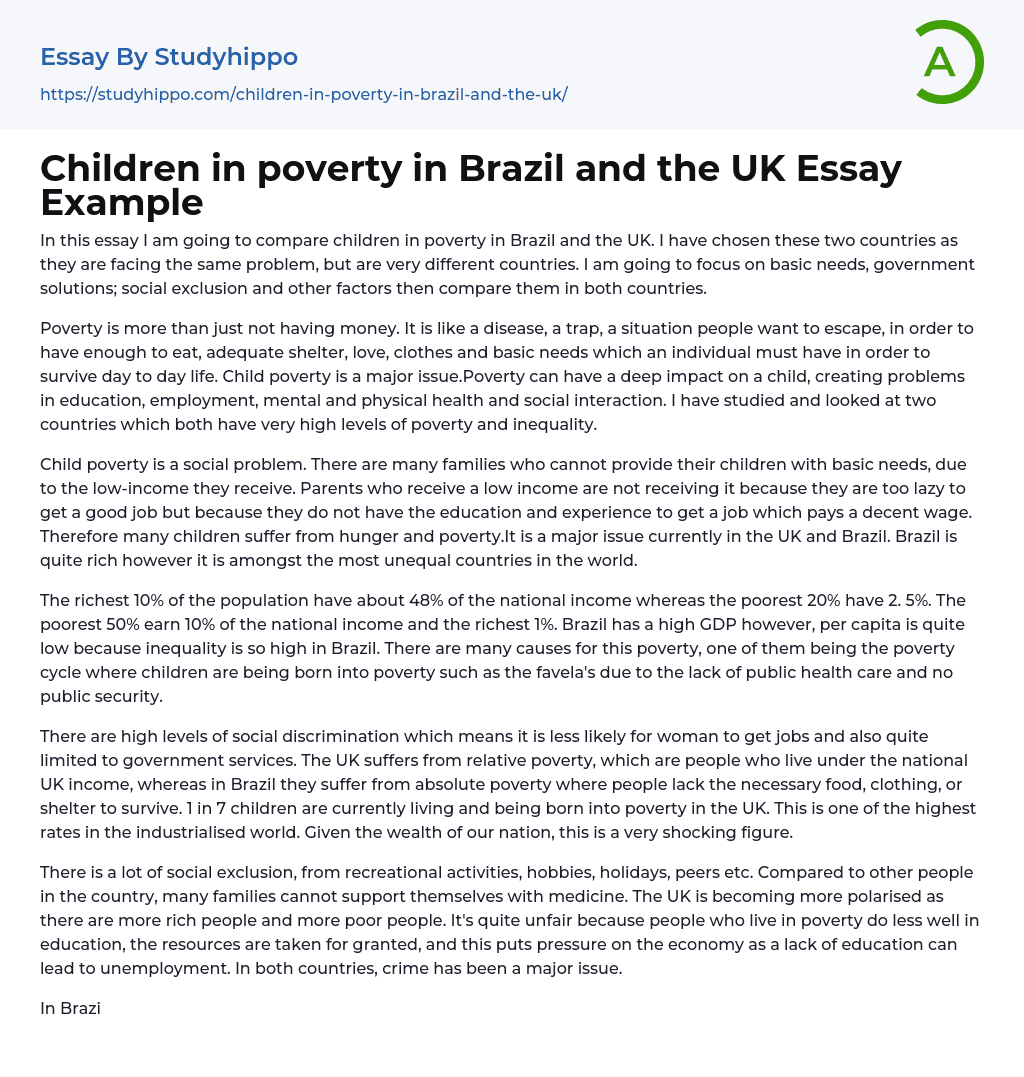The primary focus of this essay is to compare children living in poverty in Brazil and the UK. Despite sharing a common issue, these two countries differ significantly. The comparison will primarily revolve around essential requirements, government interventions, social segregation, and other pertinent aspects to evaluate both nations.
Poverty extends beyond material deprivation. It is comparable to an ailment, a snare, a predicament people strive to evade, to attain food security, fitting accommodations, love and care, clothing as well as other rudimentary requisites crucial for survival in everyday living. Of particular significance is child poverty, given its far-reaching effects on education, employment prospects, psychological and physiological well-being, and social connection. Two countries that I have examined have starkly high levels of impoverishment and inequality.
Child poverty is a prevalent issue in bo
...th the UK and Brazil, where families cannot afford their children's basic needs due to insufficient earnings. The reason for parents' inability to secure high-paying jobs is typically a lack of knowledge or skills rather than laziness. As a result, children living in these households experience destitution and malnourishment, exacerbating the situation. Despite its prosperity, Brazil is known as one of the world's most unequal countries.
Despite a high GDP, Brazil experiences extensive inequality. Almost half of the national income is controlled by the top 10% of the population, while only 2.5% belongs to the bottom 20%. Additionally, the wealthiest 1% holds a significant portion of total income in contrast to just 10% earned by the bottom half. This wealth distribution disparity yields low per capita income for Brazil. Several factors sustain poverty, including an ongoing cycle that entraps people in destitution - particularly in
areas like favelas where access to public healthcare and security is limited.
Women face restricted entry to employment and government services when subjected to high levels of social discrimination. The UK has relative poverty - individuals living below the national income, while Brazil endures absolute poverty where people lack fundamental necessities like food, clothing, and shelter. Astonishingly, one in seven kids born in the UK currently resides in poverty, a remarkably high rate among affluent nations considering the country's wealth.
Social exclusion is a common issue across different domains like leisure, hobbies, travel and social groups. A significant proportion of households in the country cannot afford medical treatment, which creates an uneven society. The UK is facing growing disparity with more affluent and deprived individuals. This inequality leads to an unfair system where economically challenged people face difficulty in education and essential facilities are often ignored, causing negative impacts on the economy due to higher unemployment rates. Both countries also encounter severe challenges from elevated crime levels.
Insufficient education in favelas and poor housing areas in the UK causes a pattern of gang violence and teenage crime. To enhance living conditions and lower crime rates, both nations require superior-quality housing options that offer low-cost, spacious residences for larger families. This strategy will prevent children from loitering on the streets and reduce child poverty.
The UK is witnessing a surge in the cost of living, posing difficulties for low-income families in supporting their loved ones. This trend has led to severe outcomes akin to Brazil, with high levels of social exclusion and inequality manifesting. Consequently, numerous children face the risk of marginalization and limited opportunities. Moreover, almost 9.5 million Britons
cannot access adequate housing due to their financial constraints. Furthermore, less than ten percent of the populace perceives everyday amenities like dishwashers, mobile phones, internet connectivity or satellite television as crucial.
Society's "barriers" such as inadequate housing, poor health, and insufficient skills hinder full participation of individuals. NGOs and governments are offering support to countries struggling with child poverty, including the UK. In one of the world's wealthiest nations, we urge the government to prioritize areas facing severe deprivation and do more to put an end to child poverty. Technology alone cannot alleviate this issue, as reducing reliance on working tax credit and benefits is also necessary. An escalation of this problem could lead to more parents failing to provide for their children.
Child labour is a widespread problem in Brazil, with minors toiling for extended periods while earning meager salaries. This exploitation of young workers does not alleviate child poverty. However, there are top-down initiatives like the government's "Fome Zero" program that aim to eliminate hunger and destitution. Conversely, bottom-up organizations such as 'the Posse' charitable groups rescue street children. Although the government tries to delegate authority to local governments, a lack of resources and cooperation can render this approach impractical.
According to me, Brazil requires economic growth to diminish inequality by improving education and reducing illness which would ultimately lead to the creation of more job opportunities. My suggestion is that the government should primarily focus on aiding underprivileged children in acquiring an education. On the other hand, the British administration must prioritize sustaining and enhancing stability.
- Overpopulation essays
- Homelessness essays
- Hunger essays
- Dumpster Diving essays
- Homelessness In America essays
- Child essays
- Child labor essays
- Childcare essays
- Abortion essays
- Abuse essays
- Animal Rights essays
- Animal Testing essays
- Assault essays
- Bullying essays
- Controversial Issue essays
- Crash essays
- Cyber Bullying essays
- Feminism essays
- Human Rights essays
- Immigration essays
- Inequality essays
- Poverty essays
- Prejudice essays
- Racism essays
- Torture essays
- Violence essays
- Adaptation essays
- Adventure essays
- Adversity essays
- Aging essays
- Alcohol essays
- Barbie Doll essays
- Beauty essays
- Care essays
- Carpe diem essays
- Change essays
- Chess essays
- Chicken essays
- Choices essays
- Contrast essays
- Crops essays
- Development essays
- Dream essays
- Evil essays
- Experience essays
- Family essays
- Farm essays
- Fire essays
- First Love essays
- Focus essays




